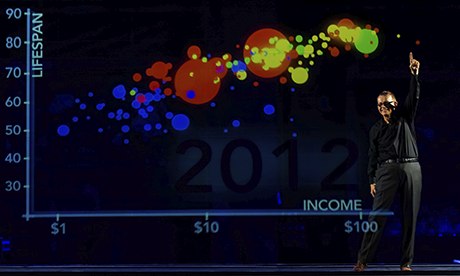The argument is familiar to geographers, but it is not familiar to most members of the general public and it bears retelling:
In almost all social and economic aspects, and in many environmental ones too, the world is getting better. From Julian Simon in the 1980s, to Bjorn Lomborg in the 1990s, and Hans Rosling, Max Roser, and Steven Pinker in the 2000s, there has been a reaction against the largely negative tone of the media, and a desire for a more fact-based, level-headed and optimistic – or at least, in the words of Rosling (2018), a ‘possibilistic’ – view of the world.

Hans Rosling with his moving bubble chart: there is a development continuum of countries, and there is a clear path towards a healthier and wealthier future for humankind
Geography is not immune to criticism in this regard. Although the discipline often prides itself on its balanced, empirical, and critical approach to the most important issues in the world, the tone of some of its output fails to reflect the global progress that has been made in areas as varied as life expectancy, peace, tolerance, sanitation and quality of life: the full list would justify a blog post in its own right, but see Pinker (2018), Rosling (2018), and Roser. It might even be said that the themes that we study – disasters, overpopulation, climate change, conflict, pollution and deindustrialisation, to name but a few – give us a handicap to begin with: could Geography be in danger of taking the mantle of ‘the dismal science’ from Economics?
The discipline has a role to play in redressing the negativity present in much of the media and politics, and its practitioners should also be aware of the psychological quirks which tend to predispose humans to look at many phenomena in a negative way (Duffy, 2018).
Negativity can be dangerous – it could make students overly fearful and more willing to think that things are out of their control, and therefore less likely to take action on some of the most important issues in society. It is also deleterious to the discipline: it may put students off taking the subject, and it can be dull to teach.
It need not be like this. I would like Geographers, whether in any branch of education, or those who consider themselves to be Geographers in other spheres, to consider the role that the discipline can play in this task. (Many readers will no doubt disagree with my premise, in which case I also welcome your input and evidence!) I will draw your comments together and in the first instance I will blog about them; later I will use them to help me prepare my session for the 2019 Geographical Association Conference; and I then plan to plunge my energies into a more formal research project.
The main themes I would like you to consider are the themes we study, the way that we approach the themes that we study, and the learning activities that we undertake.
A few of my first – perhaps provocative – thoughts are below:
- Do we sometimes fail to communicate the dynamic nature of some of our subjects? Should we reframe enquiry questions to reflect the ‘direction of travel’ of the world – for example, should we ask ‘Why are some countries rich?’, rather than ‘Why are some countries poor?’
- Do we focus on the ‘worst case’ studies and places, and when those areas improve, do we drop them for the next ‘worst case’, rather than looking at how most places quietly and gradually improve over time?
- Is enough attention paid to historical successes? Within Health Geography, for instance, why is the rapid drop in mortality and morbidity due to the collapse of polio and smallpox often absent?
- In terms of some of the ‘tricky’ themes such as climate change and globalisation, do we accurately convey the relative scale of positives compared to negatives?
- Is enough attention paid within Geography to the power of the media and politics, and on how psychology affects our perceptions of reality?
- Is there a need for a radical programme of teacher re-training to enable practitioners to get an accurate world-view?
- Are we too scared as a discipline to contemplate the promulgation of a more ‘hopeful Geography’, for fear of being labelled reactionary, or even mouthpieces of the alt-right?
Finally, if you have any examples of activities or resources you have come across that either foster an unjustifiably negative world view, or, in contrast, those which gear students up to take a more fact-based view of the world, then please also let me know (one such example of the latter is Paul Turner’s six-lesson scheme of work on ‘Factfulness’).
You will appreciate that these are just some short and basic thoughts on the matter, and they lack polish.
Thank you for your time.
David
Some further reading:
Duffy, B. (2018) The Perils of Perception (Atlantic)
Pinker, S (2018) Enlightenment Now: The Case for Reason, Humanism and Progress (Allen Lane)
Roser, Max (n.d.): Our World in Data: www.ourworldindata.org
Rosling, H, Rosling, O and Rosling-Ronnlund, A (2018) Factfulness (Sceptre)
3 replies on “A hopeful Geography?”
[…] have not repeated any of the suggestions/provocations from my previous post, which can be found here. But I have split the articles into two parts: this is the first installment, which contains some […]
LikeLike
[…] education sector I argue elsewhere that much of today’s education, particularly in the social sciences and humanities, contributes […]
LikeLike
[…] and ‘Enlightenment Now’ by Steven Pinker (2018), and which I have written about here and in Alcock (2019a, […]
LikeLike